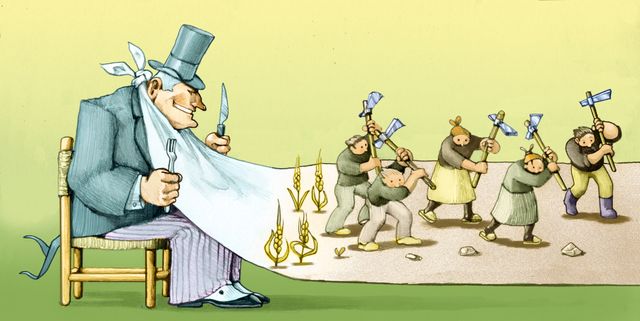3.2.1
Mrs Birling Analysis
Roles of Mrs Birling
Roles of Mrs Birling
Mrs Birling is a stereotypical upper-class pre-war woman with capitalist views. She lets her husband control her, even though she is of a higher class.


Role in the family
Role in the family
- Although she is of a higher class than her husband, she is subservient (lets him control her) to him in a patriarchal (male ruled) household and society.
- She is in charge of the household and of teaching Sheila how to be a good-mannered young lady who understands pre-war etiquette perfectly.


Role in the play
Role in the play
- Priestley portrays a stereotypical upper-class pre-war woman – she is concerned about her reputation, social status and appearance.
- Her priorities are to keep an unblemished (perfect) reputation and dress well so as to show off her husband’s wealth.
- She shares her husband’s capitalist ideas about people only looking after themselves – she is uninterested in how her actions affect others.
- Mrs Birling represents the selfish attitudes of the wealthy higher classes. She thinks lower-class people deserve their misfortune and thinks they are completely inferior to her.


Connection with Eva
Connection with Eva
- When a pregnant Eva approached the Brumley Women’s Charity Organisation for financial help, Mrs Birling (who chaired the committee) took a disliking to her and refused to give her any help.
Character Development of Mrs Birling
Character Development of Mrs Birling
Mrs Birling represents the uncaring upper class. She won't accept blame and doesn't learn anything from the interrogation. She tries to intimidate Inspector Goole and her husband.


Cold-hearted
Cold-hearted
- Priestley highlights Mrs Birling as cold-hearted and unlikable throughout the play.
- Right from the start, she scolds Mr Birling for a small social error.


Uncaring upper class
Uncaring upper class
- Priestley uses Mrs Birling to really bring out the uncaring, selfish, self-centred nature of the upper classes in society.
- He felt that these were the people who needed to change in order to improve wider society.
- People like Mrs Birling needed to care about other people to accept the changes that needed to happen to improve everyone’s lives (not just those of the upper classes).
- Mrs Birling refuses to even cooperate with a police detective, showing that she feels she is above the law – instead, she challenges him and calls him ‘impertinent’ for doing his job.


Accepts no blame and doesn't change
Accepts no blame and doesn't change
- Although she comes to accept her children’s faults by the end, Mrs Birling refuses to accept that she played any role in Eva Smith’s death.
- She does not care at all about the lives of the lower classes, and feels that Eva’s misfortunes were her own fault.
- By the end of the play, Mrs Birling has also not changed at all. She wants to dismiss the whole evening.
- Is this why they get a second visit from a real police inspector? Does Inspector Goole act as a warning, which they do not take?


Interactions with Inspector Goole
Interactions with Inspector Goole
- She is the only character to stay completely unaffected by Inspector Goole’s revelations – she shows no emotion about Eva until she learns about Eric’s involvement.
- Mrs Birling also tries to intimidate Inspector Goole into leaving and lies to him outright.
- Later in the play, she tries to deny truths that she doesn’t want to believe because they tarnish (ruin) the perfect image of the family (such as Eric’s drinking and Gerald’s affair with Eva).
Significance of Mrs Birling
Significance of Mrs Birling
Mrs Birling highlights the negative aspects of capitalism and how the upper classes mistreated lower-class people.


Negative aspects of capitalism
Negative aspects of capitalism
- Priestley uses Mrs Birling to highlight serious social issues in British society – capitalism bred people who did not care for anyone but themselves, and who saw lower-class people as less than human.
- This means that they did not care how they treated these people.
- Priestley presents Mrs Birling as a villain to encourage the audience to understand the horrible consequences of a capitalist society – he knew that social attitudes needed to change for society to become fairer and more caring.


Mistreatment of lower classes
Mistreatment of lower classes
- Mrs Birling also helps to show how terrible life was for lower-class people in pre-war Britain – their lives depended on higher-class people making the decisions for them.
- If their social superiors chose to mistreat them, or not help them, there was little that lower-class people could do to have a happy life.
1Plot Summary
2Context & Key Themes
2.1Context & Key Themes
2.1.1Social Class & Equality
2.1.2Class Tension
2.1.3Abuse of Power & Corruption
2.1.4Socialism vs Capitalism
2.1.5Blame & Responsibility
2.1.6Attitudes to Women
2.1.7Characterisation of Women
2.1.8Dramatic Function of Characters
2.1.9End of Topic Test - Context & Key Themes
2.1.10End of Topic Test - Context & Key Themes 2
2.1.11Grade 9 - Key Themes
2.1.12Diagnostic Misconceptions - Socialism vs Communism
2.1.13Diagnostic Misconceptions - Edna
2.1.14Diagnostic Misconceptions - Women in the Play
2.1.15Diagnostic Misconceptions - Eva Smith
3Key Characters
3.1Mr Birling
3.2Mrs Birling
3.6Inspector Goole
3.7Grade 9 - Key Characters
4Authorial Method
5Recap: Main Quotes
5.1Mr Birling Quotes
5.2Mrs Birling Quotes
5.6Inspector Goole Quotes
Jump to other topics
1Plot Summary
2Context & Key Themes
2.1Context & Key Themes
2.1.1Social Class & Equality
2.1.2Class Tension
2.1.3Abuse of Power & Corruption
2.1.4Socialism vs Capitalism
2.1.5Blame & Responsibility
2.1.6Attitudes to Women
2.1.7Characterisation of Women
2.1.8Dramatic Function of Characters
2.1.9End of Topic Test - Context & Key Themes
2.1.10End of Topic Test - Context & Key Themes 2
2.1.11Grade 9 - Key Themes
2.1.12Diagnostic Misconceptions - Socialism vs Communism
2.1.13Diagnostic Misconceptions - Edna
2.1.14Diagnostic Misconceptions - Women in the Play
2.1.15Diagnostic Misconceptions - Eva Smith
3Key Characters
3.1Mr Birling
3.2Mrs Birling
3.6Inspector Goole
3.7Grade 9 - Key Characters
4Authorial Method
5Recap: Main Quotes
5.1Mr Birling Quotes
5.2Mrs Birling Quotes
5.6Inspector Goole Quotes
Unlock your full potential with Seneca Premium
Unlimited access to 10,000+ open-ended exam questions
Mini-mock exams based on your study history
Unlock 800+ premium courses & e-books